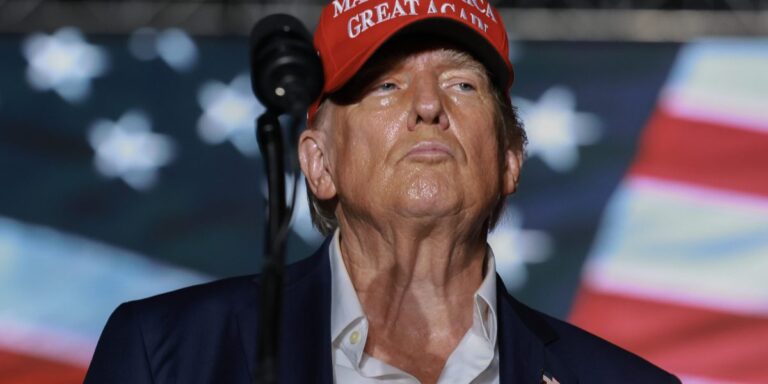CEOs are forced to swallow their tongues when discussing former President Donald Trump because they fear he will retaliate against them, according to former American Express CEO Ken Chenault.
“The fear is real,” Chenault said. Bloomberg in a lengthy article detailing Trump’s economic policies.
Chenault, now chairman of venture capital firm General Catalyst, accused company leaders of fearing Trump would retaliate against them if they said anything negative about him.
“People don’t intervene because they are so afraid of retaliation,” Chenault said.
Chenault did not respond to a request for comment. A General Catalyst spokesperson said Chenault was speaking as a private citizen. “General Catalyst does not endorse any presidential candidate,” they said in an emailed statement. “As a company, we will work with any presidential administration.”
During the presidential campaign, Trump has repeatedly said he would seek revenge against enemies if he wins the White House. On several occasions, he has used the word “revenge,” as did Chenault. In an interview with television host Dr. Phil shortly after he was found guilty of 34 felony counts of financial fraud for his 2016 campaign related to hush-money payments made to porn star Stormy Daniels, Trump praised the idea of revenge. “Sometimes revenge is justified,” Trump said.
The Trump campaign did not respond to a request for comment.
Trump’s threats have largely been directed at his political opponents, whom he says “deserve” to be prosecuted. However, he has also expressed a dislike for a number of business leaders. In particular, he has expressed a dislike for Silicon Valley executives, with Meta CEO Mark Zuckerberg and Amazon founder and CEO Jeff Bezos among his favorite targets. Zuckerberg has been a frequent target of his ire, dating back to Meta’s decision to ban the former president from Facebook and Instagram after a mob of his supporters stormed the Capitol on January 6, 2021. Meta lifted the ban in February 2023.
That hasn’t done much to mend fences in Trump’s eyes. Last week, the Republican nominee called Zuckerberg an “Election Fraudster,” baselessly accusing the Meta CEO of rigging the U.S. election and threatening to have him jailed. “DON’T DO IT! ZUCKERBUCKS, watch out!” Trump wrote on his social media platform Truth Social.
Meanwhile, Bezos earned the Trumpian nickname “Jeff Bozo” in a 2019 post on X (formerly Twitter). The dispute between the two began when Bezos opposed Trump’s 2017 immigration ban on Muslim-majority countries. Bezos’ ownership of Washington Postwhose coverage of Trump’s administration has often taken issue with, also doesn’t help the tech billionaire’s good reputation with the former president.
It’s not just the personal feuds and threats of political retaliation (which are concerning in themselves) that corporate leaders are also concerned about the substance of Trump’s economic policies. On more than one occasion, Trump has said he wants to impose 60% tariffs on all Chinese goods and 10% tariffs on all other foreign goods. For top executives of Fortune 500 companies, the idea of paying 10% more for every product their sprawling companies might need from another country could pose extreme financial hardship. Economists widely expect Trump’s policies to be inflationary if he gets them done. All of his policies are expected to be Trump’s allies have also floated plans to reduce the independence of the Federal Reserve, which business leaders have rejected, according to The Wall Street Journal.
In recent weeks, Yale professor Jeffery Sonnenfeld, who has close ties to top CEOs, has slammed Trump for what he sees as policies that will hurt U.S. businesses. “Trump’s position is more like Karl Marx than Adam Smith,” Sonnenfeld wrote in an article. New York Times opinion published last month.
Still, many CEOs seem to believe Trump will serve a second term, and they have made the traditional executive pilgrimage to leading presidential candidates. Although a June meeting between former President Donald Trump and a group of top CEOs left mixed impressions for both sides. The (unnamed) CEOs told their advisers that Trump was “very erratic” and “not thinking straight,” according to CNBC.
Meanwhile, Trump told Bloomberg that the meeting was a “love fest” where he was not only adored but also praised, flattered and admired by corporate leaders.


